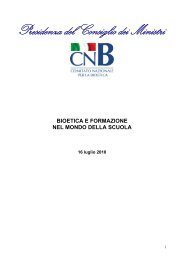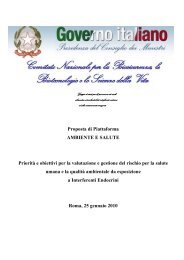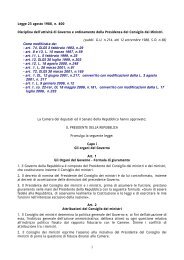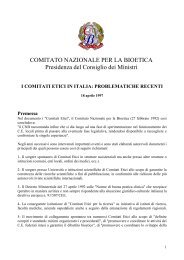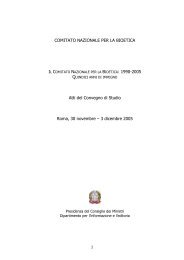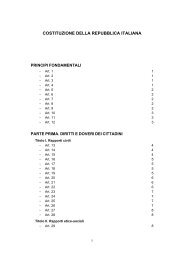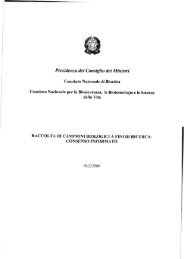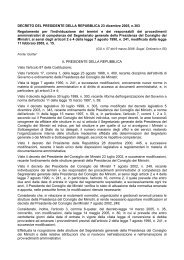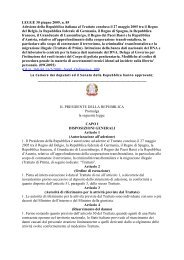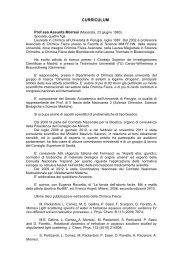President
President
President
Create successful ePaper yourself
Turn your PDF publications into a flip-book with our unique Google optimized e-Paper software.
elaborating the data received highlighting eventual anomalies between the<br />
protocols and their practical realisations.<br />
4. Conscientious objection to animal testing (Law n° 413, 12th of<br />
October 1993)<br />
The growing sensitivity of modern society towards animals found a<br />
significant expression in Law n° 413, 12 th of October 1993, which recognised<br />
the right to “citizens who, in obedience to their conscience, exercising their<br />
freedom of thought, conscience and religion recognised by the Universal<br />
Declaration of Human Rights, by the Convention for the Protection of Human<br />
Rights and Fundamental Freedoms and by the International Covenant on Civil<br />
and Political Rights, oppose violence on all living beings” to “declare their<br />
conscientious objection to every act connected to animal testing” (Article 1).<br />
The Law No.413/1993 contemplates this possibility for “doctors,<br />
researchers and healthcare personnel in the roles of qualified, technical,<br />
nursing professionals and for the university students concerned”, who, once<br />
they have declared their conscientious objection, “are not required to take part<br />
directly in the activities and interventions specifically and necessarily directed<br />
to animal testing” (Article 2).<br />
With regards to the way this right can be exercised, article 3 clarifies<br />
that “conscientious objection is stated at the time of applying for employment<br />
or participating in a public contest”, “university students declare their<br />
conscientious objection to the professor teaching the course within which<br />
there can be activities or interventions of animal testing, at the beginning of<br />
the course”, “the declaration of conscientious objection can be withdrawn at<br />
any time”. These regulations presume that these are profound existential<br />
choices that imply, in their exercise and evaluation, significant coherence and<br />
continuity.<br />
Of particular interest is subsection 5 of Article 3, according to which “All<br />
public and private establishments legally allowed to carry out animal testing<br />
are obliged to communicate to all workers and students their right to exercise<br />
conscientious objection to animal testing. The establishments are also obliged<br />
by the current law to set up a form for the declaration of conscientious<br />
objection to animal testing”.<br />
Unfortunately we must acknowledge that this double obligation –<br />
expressly contemplated by the law -, has been largely overlooked and that a<br />
very limited number of faculties have belatedly carried out those duties only<br />
after formal requests aimed at ensuring the outmost dissemination of the law.<br />
Article 4 ratifies the prohibition of discrimination stating in subsection 1<br />
that “no-one can be made to suffer negative consequences for refusing to<br />
practice or to cooperate to the execution of animal testing”, and supporting<br />
(subsection 2) the objectors’ right – “whether they are public or private<br />
employees, to be allocated, within the existing organic apparatus, to activities<br />
other than those requiring animal testing, retaining the same qualification and<br />
the same salary”.<br />
As we can see, these are imperative instructions that include, in the<br />
following subsection 3, even universities, whose “competent bodies must<br />
make the attendance to laboratory exercises involving animal testing,<br />
65




